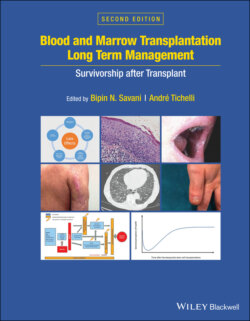Читать книгу Blood and Marrow Transplantation Long Term Management - Группа авторов - Страница 113
Infectious Complications
ОглавлениеLate infectious complications are more common with allogeneic‐transplant compared to AHSCT due to the need for prolonged immunosuppression in allogeneic‐transplant recipients. In the Bone Marrow Transplant Survivor Study, late infections were not a major cause of mortality in AHSCT survivors [8]. However, the median age at transplant in this study was low at 37 years and the cohort did not include patients with MM, which is currently the most common indication for AHSCT. A Finnish study of approximately 1500 adult AHSCT recipients with lymphoma, MM, or breast cancer demonstrated infectious complications as a cause of later (>100 days) non‐relapse mortality in one‐third of patients who had died at latest follow‐up [52]. The most common fatal late infections were sepsis and pneumonia, with the median time from AHSCT to fatal infection being 28 months [52]. A French study on late effects (defined as >30 days) in AHSCT recipients of aggressive NHL showed infections in approximately one‐third of patients with late toxicities though none were fatal [53]. Another Canadian study on long‐term survivors of AHSCT for primary‐refractory or relapsed HL showed unusual infections, including varicella zoster virus (VZV) infection in 34% of patients at a median of 6 months and cutaneous or respiratory infections beyond 5 years posttransplant, including S. aureus and Aspergillus pneumonia, streptococcal necrotizing fasciitis, and bacterial endocarditis [54].
All patients should receive recommended posttransplant vaccinations, starting 3 months after AHSCT [19]. Since efficacy of most vaccinations depend on reconstitution of the adaptive immune system, consensus guidelines recommend deferring vaccinations to 12 months after transplant, if patients have received anti‐CD20 monoclonal antibody less than six months prior [19]. Similar logic can be extended to those who had received monoclonal antibodies directed against plasma cells, including anti‐CD38, anti‐SMAMF7, and anti‐BCMA. Detailed guidelines on posttransplant vaccinations are beyond the scope of this chapter and have been summarized elsewhere [19].
